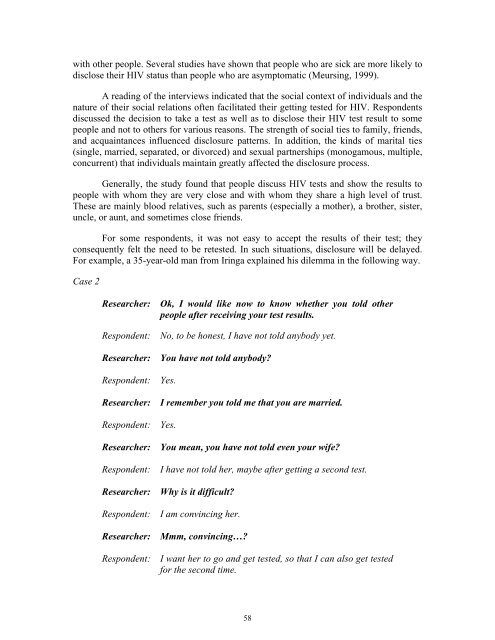social context of disclosing hiv test results: hiv testing in tanzania
social context of disclosing hiv test results: hiv testing in tanzania
social context of disclosing hiv test results: hiv testing in tanzania
You also want an ePaper? Increase the reach of your titles
YUMPU automatically turns print PDFs into web optimized ePapers that Google loves.
with other people. Several studies have shown that people who are sick are more likely to<br />
disclose their HIV status than people who are asymptomatic (Meurs<strong>in</strong>g, 1999).<br />
A read<strong>in</strong>g <strong>of</strong> the <strong>in</strong>terviews <strong>in</strong>dicated that the <strong>social</strong> <strong>context</strong> <strong>of</strong> <strong>in</strong>dividuals and the<br />
nature <strong>of</strong> their <strong>social</strong> relations <strong>of</strong>ten facilitated their gett<strong>in</strong>g <strong>test</strong>ed for HIV. Respondents<br />
discussed the decision to take a <strong>test</strong> as well as to disclose their HIV <strong>test</strong> result to some<br />
people and not to others for various reasons. The strength <strong>of</strong> <strong>social</strong> ties to family, friends,<br />
and acqua<strong>in</strong>tances <strong>in</strong>fluenced disclosure patterns. In addition, the k<strong>in</strong>ds <strong>of</strong> marital ties<br />
(s<strong>in</strong>gle, married, separated, or divorced) and sexual partnerships (monogamous, multiple,<br />
concurrent) that <strong>in</strong>dividuals ma<strong>in</strong>ta<strong>in</strong> greatly affected the disclosure process.<br />
Generally, the study found that people discuss HIV <strong>test</strong>s and show the <strong>results</strong> to<br />
people with whom they are very close and with whom they share a high level <strong>of</strong> trust.<br />
These are ma<strong>in</strong>ly blood relatives, such as parents (especially a mother), a brother, sister,<br />
uncle, or aunt, and sometimes close friends.<br />
For some respondents, it was not easy to accept the <strong>results</strong> <strong>of</strong> their <strong>test</strong>; they<br />
consequently felt the need to be re<strong>test</strong>ed. In such situations, disclosure will be delayed.<br />
For example, a 35-year-old man from Ir<strong>in</strong>ga expla<strong>in</strong>ed his dilemma <strong>in</strong> the follow<strong>in</strong>g way.<br />
Case 2<br />
Researcher: Ok, I would like now to know whether you told other<br />
people after receiv<strong>in</strong>g your <strong>test</strong> <strong>results</strong>.<br />
Respondent: No, to be honest, I have not told anybody yet.<br />
Researcher: You have not told anybody?<br />
Respondent: Yes.<br />
Researcher: I remember you told me that you are married.<br />
Respondent: Yes.<br />
Researcher: You mean, you have not told even your wife?<br />
Respondent: I have not told her, maybe after gett<strong>in</strong>g a second <strong>test</strong>.<br />
Researcher: Why is it difficult?<br />
Respondent: I am conv<strong>in</strong>c<strong>in</strong>g her.<br />
Researcher: Mmm, conv<strong>in</strong>c<strong>in</strong>g…?<br />
Respondent: I want her to go and get <strong>test</strong>ed, so that I can also get <strong>test</strong>ed<br />
for the second time.<br />
58

















